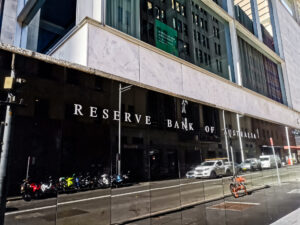Workers Cause Inflation, but Owners Don’t?
Share
Any time wages are increased business groups say it will fuel inflation, but they say nothing about the impact of their massive dividends
The RBA and other orthodox thinkers have been laser-focused on preventing wages from keeping up with recent inflation, claiming that will lock in “inflationary expectations” and set off the much-feared “wage-price spiral”.
Never mind that wages lagged well behind prices from the outset of this post-pandemic inflationary episode, and that it’s corporate profits that have broken all-time records – as companies in many parts of the economy took advantage of supply shortages, desperate consumers, and global shocks to jack up prices far beyond costs. Average real wages in Australia have fallen over 6% since this inflation began, and wages are still growing slower than prices so the cut is getting deeper.
Nevertheless, the RBA continues to target workers to bear the brunt of inflation they didn’t cause (by cementing that real wage cut). The RBA’s new Governor, Michelle Bullock, claimed unemployment must rise to 4.5% in order to suppress wage growth. And the RBA has fretted about the recent increase in Award wages, saying it will contribute to future inflation.
Research from the Centre for Future Work found that a 1% increase in Award wages increases the national wage bill by just $1.38 billion (because workers on Awards make so much less than average wages). So the 5.75% minimum wage increase announced by the Fair Work Commission will increase the national wage bill by less than $8 billion.
Compare that to the flood of extra income payouts resulting from Australia’s record corporate profits. Last year alone, dividend payouts by Australian corporations grew $54 billion – almost 7 times as much as the Award wage increase. And that doesn’t include other ways corporations payout extra cash to owners (such as share buy-backs, very common among companies that reaped more profits than they know what to do with).
These flows of capital income elicit no concern whatsoever from the RBA, focused myopically on the alleged dangers of higher wages. Similarly, according to FOI requests, the RBA has not even bothered to analyse the potential impact on inflation of $313 billion in Stage 3 tax cuts – received mostly by high-income households, not Award-covered workers.
It seems that, in the RBA’s mindset, workers cause inflation anytime they get a bit more money. But owners can’t cause inflation, even when they get billions.
Between the Lines Newsletter
The biggest stories and the best analysis from the team at the Australia Institute, delivered to your inbox every fortnight.
You might also like
When targeting inflation, the RBA misses more often than it hits
With the fight against high inflation now over, will the Reserve Bank fail to learn the lessons of the past and allow inflation to fall below 2%?
The continuing irrelevance of minimum wages to future inflation
Minimum and award wages should grow by 5 to 9 per cent this year
Fearful and frozen: Why the Reserve Bank continues to err on rates
The RBA’s failures have real consequences. It should go back and closely reread the recommendations of the RBA review, particularly the ones that encourage it to open up to new and diverse viewpoints.

